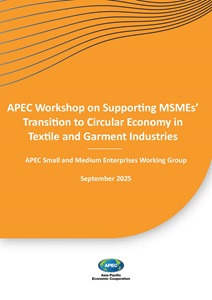
Reports
APEC Regional Trends Analysis, October 2025
The Asia-Pacific Economic Cooperation (APEC) is a regional economic forum established in 1989 to leverage the growing interdependence of the Asia-Pacific.
The Asia-Pacific Economic Cooperation (APEC) is a regional economic forum established in 1989 to leverage the growing interdependence of the Asia-Pacific.
APEC ensures that goods, services, investment and people move easily across borders. Members facilitate this trade through faster customs procedures at borders; more favorable business climates behind the border; and aligning regulations and standards across the region.
APEC ensures that goods, services, investment and people move easily across borders. Members facilitate this trade through faster customs procedures at borders; more favorable business climates behind the border; and aligning regulations and standards across the region.
APEC works to help all residents of the Asia-Pacific participate in the growing economy.
APEC works to help all residents of the Asia-Pacific participate in the growing economy.
Capacity building projects play an important role in helping translate APEC's goals into reality.
Capacity building projects play an important role in helping translate APEC's goals into reality.

Proceedings
•September 2025
Download Report
1MB
Published Under
SOM Steering Committee on Economic and Technical Cooperation (SCE), Small and Medium Enterprises Working Group (SMEWG)
Accessed
309
Pages
26
The APEC Workshop on Supporting MSMEs’ Transition to Circular Economy in Textile and Garment Industries aims to promoting capacity building for MSMEs in textile and garment industry to adopt CBM through sharing knowledge, experiences and practices from speakers, experts, and participants from the APEC member economies. From the sharing, they came up with a number of highlights and recommendations that are beneficial to promote MSMEs in textile and garment industry to adopt CBM. For example, they might include but not limited to: raising awareness for MSMEs in textile and garment industry of the importance and benefits of adopting CBM as an intrinsic business strategy for long-term growth and development; invest further in infrastructure and innovation (e.g.: establishment of digital centres, regional hubs for innovation, etc.,); promoting MSMEs’ access to green loans, grants, tax reduction for eco-friendly textile products, etc., to facilitate their adoption of CBM as well as promote networking market platforms to enhance market access; promoting collaboration and cooperation between multi-stakeholders; developing an APEC circular fashion innovation lab (including developing a directory of experts; compilation and sharing of local wisdom/knowledge/culture/indigenous; establishing a center of excellence, etc.,); launching and sustaining APEC circular awards to encourage and/or inspire the adoption of CBM in industries in general, textile and garment industry in particular; developing an APEC digital platform for promoting CBM products and lifestyles; supporting eco-label certifications; and so on.

